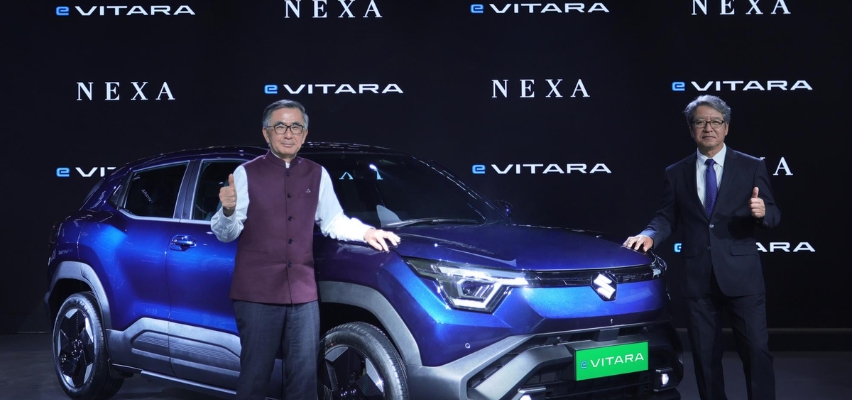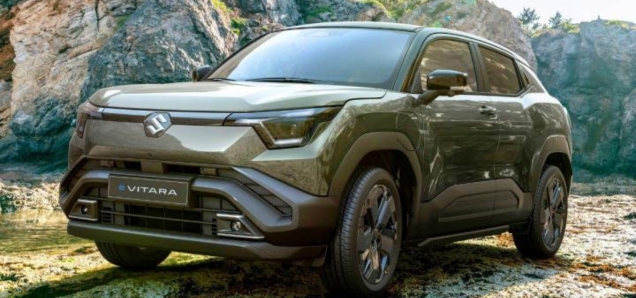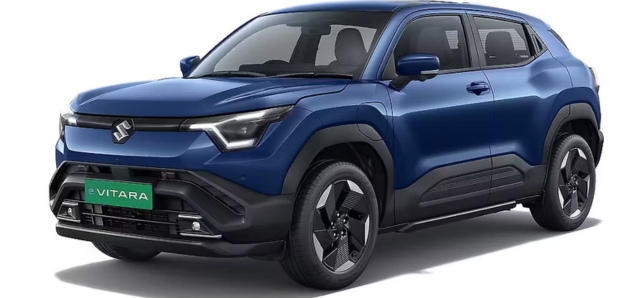PM Modi Flags Off Maruti Suzuki's First Electric Vehicle e-Vitara, Marking India's Entry into Global EV Market
In a historic moment for India's automotive industry, Prime Minister Narendra Modi today flagged off the first production unit of Maruti Suzuki's e-Vitara, the company's first globally-oriented electric vehicle, at the Suzuki Motor Plant in Hansalpur, Gujarat. The event marks India's emergence as a significant player in the global electric vehicle market and reinforces the country's position as a manufacturing hub for green mobility solutions.
1. Event Overview and Significance
-
Prime Minister Narendra Modi presided over the ceremonial flag-off of the first e-Vitara unit, calling it a "special day in India's quest for self-reliance" and a testament to the country's manufacturing capabilities. The event was attended by Gujarat Chief Minister Bhupendra Patel, Japanese Ambassador to India Keiichi Ono, and Suzuki Motor Corporation Representative Director and President Toshihiro Suzuki.
-
The Prime Minister emphasized that this initiative represents a crucial step toward realizing the 'Make in India, Make for the World' vision, with electric vehicles manufactured in India now set to be exported to more than 100 countries worldwide, including technologically advanced markets like Japan and European nations. This achievement is particularly significant as it demonstrates global confidence in India's manufacturing quality and technical capabilities.
2. Global Production and Export Plans
-
The Hansalpur facility has been designated as Suzuki's global production hub for the e-Vitara, manufacturing both right-hand and left-hand drive variants for international markets. Exports will include emerging economies such as Indonesia, the Philippines, South Africa, and Thailand, as well as developed markets including France, Germany, and the United Kingdom.
-
According to production plans, Maruti Suzuki aims to manufacture approximately 67,000 units of the e-Vitara by March 2026, with the majority destined for export markets. The first batch of vehicles is scheduled for shipment to Europe, where Suzuki plans to begin sales in autumn 2025. This export initiative represents a significant reversal of roles for India's automotive sector, which has traditionally been an importer of sophisticated automotive technology rather than an exporter to developed markets.
-
The e-Vitara is built on the 40PL dedicated EV platform (branded as HEARTECT-e), developed in collaboration with Toyota Motor Corporation. This born-electric platform features a skateboard architecture with integrated battery systems and has been designed to meet global safety standards, including EuroNCAP, ASEAN NCAP, and stringent Japanese crash requirements.
-
The electric SUV offers two battery options: a 49 kWh pack for the standard-range model and a 61 kWh pack for long-range versions. The long-range variant is also available with an optional dual-motor all-wheel-drive system (marketed as AllGrip-e) that provides enhanced traction and off-road capability.
Maruti Suzuki e-Vitara Technical Specifications
| Variant |
Battery Capacity |
Drive Type |
Power Output |
WLTP Range |
| Standard Range |
49 kWh |
FWD |
106 kW |
344 km |
| Long Range |
61 kWh |
FWD |
106 kW |
426 km |
| Long Range AWD |
61 kWh |
AWD |
135 kW |
395 km |
The e-Vitara features what Suzuki describes as an "Emotional Versatile Cruiser" design, combining advanced technological elements with a robust SUV appearance. The vehicle offers a nimble and sharp driving experience, with the AWD version providing not only off-road capability but also powerful performance.
3. Battery Manufacturing and Localization
-
In a parallel development crucial to India's electric vehicle ecosystem, Prime Minister Modi also inaugurated the local production of hybrid battery electrodes at the TDS Lithium-Ion Battery Gujarat (TDSG) facility, a joint venture between Toshiba, Denso, and Suzuki 14. This facility represents India's first plant to produce lithium-ion batteries from the cell level, having started production of batteries for mild hybrid vehicles in 2021.
-
The localization of battery electrode production is significant because it ensures that more than 80% of the battery value will now be manufactured within India, substantially reducing dependence on imports and strengthening the country's global competitiveness in clean mobility 49. However, it's important to note that while electrode manufacturing has been localized, the e-Vitara will initially continue to use imported lithium-ion phosphate battery cell packs supplied by Chinese EV giant BYD.
-
Industry experts have highlighted the importance of this step in developing a comprehensive EV supply chain within India. Vikram Handa, MD of Epsilon Advanced Materials, noted that "the local manufacturing of the electrode will definitely give a boost to the EV segment," while emphasizing the need to further localize production of anode and cathode materials to achieve true supply chain independence.
4. Investment and Future Plans
-
Suzuki Motor Corporation has announced ambitious investment plans for India, pledging to invest ¥700 billion (approximately $8 billion) over the next five to six years to expand its manufacturing capabilities and develop new products . This investment underscores the company's commitment to India as its most important market and global production hub.
-
The Hansalpur facility currently operates three production lines, each with an annual capacity of 250,000 units. The e-Vitara is being manufactured on the third line, which was brought online in April 2021. As part of the expansion plans, Suzuki will add a dedicated EV production line by March 2026, also with a capacity of 250,000 units. The investment for this expansion alone amounts to ₹32 billion (approximately €313 million).
-
Beyond vehicle manufacturing, Prime Minister Modi also announced plans for six new semiconductor manufacturing plants and launched the National Critical Mineral Mission, which will conduct over 1,200 exploratory campaigns to secure rare minerals crucial for the EV and automotive sectors . These initiatives address critical dependencies in the electronics supply chain and reinforce India's commitment to building a comprehensive EV ecosystem.
5. Strategic Context and Market Impact
-
The launch of the e-Vitara and the accompanying battery manufacturing initiatives represent a significant milestone in India's green mobility transition. The government has set an ambitious target for electric vehicles to account for 30% of all vehicle sales by 2030, up from the current approximately 4.5% share. The e-Vitara will compete in the market with vehicles such as the Mahindra BE6, Hyundai Creta Electric, and MG ZS EV.
-
The anticipated starting price for the e-Vitara is approximately ₹20 lakh (ex-showroom), positioning it in the premium segment of the Indian market 1. Maruti Suzuki plans to support the vehicle with an extensive service network, including 1,500 EV-ready workshops across 1,000 cities, home charger installations, and public fast-charging stations every 5-10 km in the top 100 cities over the next three years.
-
The event also held diplomatic significance, coming just days before Prime Minister Modi's scheduled visit to Japan for the 15th India-Japan Annual Summit—his first standalone visit to Japan in nearly seven years . The automotive collaboration between India and Japan, exemplified by the Suzuki projects, highlights the deepening economic ties between the two Asian democracies.
Conclusion:
The production launch of the e-Vitara represents more than just another vehicle introduction—it signals India's arrival as a serious player in global electric vehicle manufacturing. By leveraging its manufacturing capabilities, technical expertise, and strategic partnerships, India has positioned itself as a competitive alternative to traditional automotive manufacturing hubs.
As Prime Minister Modi stated during the event: "India possesses the strength of democracy, the advantage of demography, and a vast skilled workforce—creating a win-win situation for every partner". This combination of factors, coupled with strategic investments in infrastructure and supply chain development, suggests that the e-Vitara may be just the first of many Indian-made electric vehicles to reach global markets in the coming years.
The success of this initiative will not only contribute to India's economic growth but also accelerate the global transition to sustainable transportation, demonstrating how developing economies can play a pivotal role in addressing shared global challenges like climate change through technological innovation and manufacturing excellence.
This development marks a significant achievement in India's journey toward sustainable mobility and manufacturing self-reliance, with potential implications for global automotive supply chains and trade patterns in the years to come.


